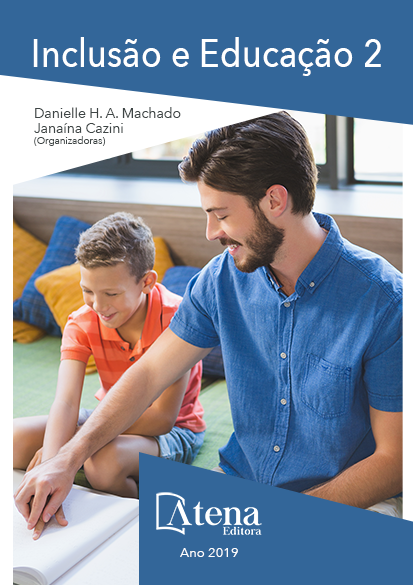
FERRAMENTAS DE INCLUSÃO PARA O ENSINO DE QUÍMICA: DESENVOLVIMENTO DE DIAGRAMAS DE DISTRIBUIÇÃO ELETRÔNICA PARA ALUNOS CEGOS E SURDOS
Apesar das legislações voltadas a
inclusão escolar de pessoas com deficiência,
observa-se que em muitos casos isso não
ocorre de maneira efetiva. A carência de
recursos didáticos adequados às necessidades
específicas dos alunos, aliado a outros fatores
como formação do professor acaba por dificultar
a aprendizagem de educandos com deficiência,
transtornos globais do desenvolvimento e
altas habilidades ou superdotação. Este texto
relata o trabalho desenvolvido em uma escola
da rede estadual do município de Linhares-
ES. O objetivo é demonstrar possibilidades
de confecção de um recurso didático inclusivo
para mediar o ensino e aprendizagem do
conteúdo distribuição eletrônica. Foram
confeccionados artefatos adaptados em Língua
Brasileira de Sinais (Libras) e em braille e
que posteriormente foram utilizados com os
alunos da 1a série do ensino médio. De acordo
com a intérprete, o material possibilitou certa
independência dos alunos surdos auxiliando
os mesmos na compreensão do conteúdo e na
resolução das atividades. Observou-se que os
materiais mediaram à aprendizagem, aspecto
evidenciado não apenas em relação aos alunos
surdos, mas aos educandos em geral. Durante a
aula todos os alunos participaram efetivamente
da atividade, conseguindo resolver as questões
propostas sem grandes dificuldades. Mesmo
diante de todas as dificuldades encontradas
pelos professores em sala é necessário que
estes se dediquem a elaboração de recursos
didáticos condizentes com as características
individuais dos alunos. Espera-se que estes
artefatos possam servir de modelo para outros
profissionais da área de Química que se
dedicam a educação inclusiva.
FERRAMENTAS DE INCLUSÃO PARA O ENSINO DE QUÍMICA: DESENVOLVIMENTO DE DIAGRAMAS DE DISTRIBUIÇÃO ELETRÔNICA PARA ALUNOS CEGOS E SURDOS
-
DOI: 10.22533/at.ed.30819150114
-
Palavras-chave: Deficiência Visual, Deficiência Auditiva, Tecnologia Assistiva, Educação Especial.
-
Keywords: Visual Impairment, Hearing Impairment, Assistive Technology, Special Education.
-
Abstract:
Despite legislation aimed at the
school inclusion of people with disabilities, it
is observed that in many cases this does not
occur in an effective way. The shortage of
didactic resources suited to the specific needs
of the students, along with other factors such as
teacher training, end up hampering the learning
of learners with disabilities, global developmental
disorders and high skills or giftedness. This text reports the work developed in a school
of the state network of the municipality of Linhares-ES. The objective is to demonstrate
possibilities of making an inclusive didactic resource, to mediate the teaching and
learning of content electronic distribution. Adapted artifacts were made in Brazilian Sign
Language (Pounds) and braille and later used with the 1st grade students. According to
the interpreter, the material allowed some independence of the deaf students helping
them in understanding the content and the resolution of activities. It was observed
that the materials mediated to the learning, aspect evidenced not only in relation to
the deaf students, but to the students in general. During the class all the students
participated effectively in the activity, being able to solve the proposed activities without
great difficulties. Even in the face of all the difficulties encountered by teachers in the
classroom, it is necessary that they devote themselves to the elaboration of didactic
resources that are in keeping with the individual characteristics of the students. It is
hoped that these artifacts could serve as a model for other chemistry professionals who
are dedicated to inclusive education.
-
Número de páginas: 15
- Laís Perpetuo Perovano


